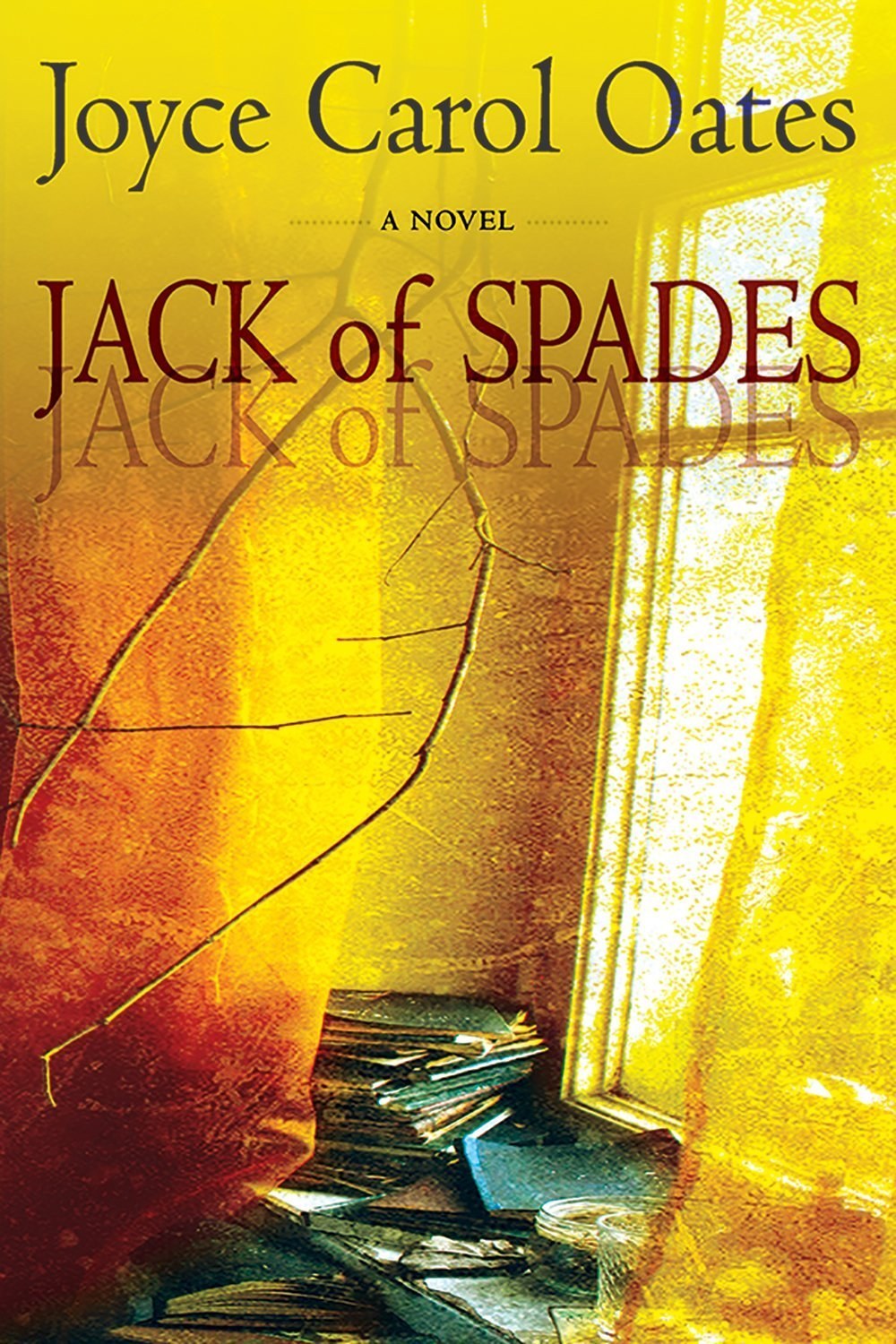
When Joyce Carol Oates moved to Princeton, New Jersey, a few years ago, she never thought she'd find herself at the center of a stalking mystery drama in real life. But as the award-winning author of over 40 books has since discovered, the lines between fiction and reality are often blurred.
Jack of Spades: A Tale of Suspense (published by Mysterious Press in May) is Oates' latest novel loosely based on these real-life events. Andrew J. Rush, the story's main character, is a successful author who writes commercial thriller novels while living in a New Jersey town with his family. Rush has his fair share of secrets, including the fact that he's been writing even darker novels under a pseudonym, and struggles with a court case brought on by an elderly neighbor who accuses him of plagiarizing her work.
BuzzFeed had the chance to ask Oates about the chilling true story behind her novel. Here's what she had to say:
BuzzFeed: What made you want to tell this story about Jack of Spades and Andrew J. Rush?
Joyce Carol Oates: Most of my projects grow out of a number of motives. This one had been in my files for some years; I had an experience that was very unsettling and somewhat mysterious which serves as the germ of the story. Jack of Spades is slightly based on a real experience and then I took it to an imaginative possibility.
What happened to you in real life?
JCO: When I first moved to Princeton, New Jersey, I started receiving some strange attention from someone you would call a stalker. She was an older woman — she may not be alive any longer — and she did not stalk me physically. She didn’t come to my house, but she stalked me indirectly. One of the things she did was she went to the local courthouse and accused me of breaking into her home to steal ideas for my writing. She thought my writing mirrored things about herself and her life. I had a lawyer and then I discovered, just as the main character in the novel does, that she had been stalking Stephen King as well. It turned out that I was a lesser interest of hers and Stephen King was her major interest. She was mostly stalking Stephen King for years but because I moved to Princeton, where she also lived, she may have thought that was some coincidence or that it was suspicious. Stephen King and I communicated about this and Stephen was very worried — he thought she might actually go to Maine and threaten his children — so he hired a private detective to investigate her and see whether she really was dangerous. They concluded that she probably was not dangerous; she was a severely psychotic person but she didn’t have a record of hurting anybody. She also was stalking John Updike and Norman Mailer but, again, not in a physical way; she was fixated upon these authors in a psychotic way and we didn't know why. Eventually it just kind of faded away. That's what gave me the idea to write Jack of Spades, but I didn’t write it for a long time.
Why did you write it?
JCO: I have a lot of projects that I’m working on. I also was not sure if this person was alive anymore and I really didn't want to stir up her antagonism; she’s obviously very unbalanced and I don’t want her coming after me again. The story's main character, Andrew Rush, has a dual personality — he has a darker side to him that comes out as a result of this experience — and this part of the fiction doesn't correspond with my own experience and reaction when this happened to me. But I was still concerned and worried because she didn’t live far away from me. I have met people who have had stalkers and there’s really a spectrum. Some are really just intense fans — they really like somebody’s work and turn up regularly — then it goes along the spectrum towards people who show more dangerous behavior, and then at the farthest extreme they might want to kill you.
Jack of Spades largely deals with ideas about plagiarism and taking ideas without exactly being conscious of it. Andrew Rush and Jack of Spades are extreme cases of this, but do you ever fear that another piece of writing might subconsciously seep into your brain and you’d emulate it too closely?
JCO: Not really; I’m not too worried about that myself. When I write, I take an idea, explore that idea, and push it to an extreme. It’s like a philosophical quest — we take ideas and possibilities and then explore them. It’s like an exercise of pure intellect to push an idea and see the different sides of it.
How does this relate to the novel?
JCO: The main character is uncertain about his reputation. He’s not a literary writer, he’s a commercial and mystery writer, who's still not as good as someone like Stephen King. He does sell millions of copies of his books, but it’s all relative, because in that world, to sell 1 million copies is not to sell 10 million outside of commercial mystery. Because of some of these insecurities, Andrew Rush is not certain of his identity. There's also a backstory where he had a brother and was inadvertently responsible for this brother’s death. When he thinks about it over and over again, he feels guilty, as one would.

Before the book starts, you quote Edgar Allan Poe’s “The Imp of the Perverse” and write, “We stand upon the brink of a precipice. We peer into the abyss — we grow sick and dizzy. Our first impulse is to shrink from the danger. Unaccountably we remain.” What do you want the reader to take away from that quote?
JCO: Poe wrote about ideas that are still being discussed and analyzed today. If you interpret “The Imp of the Perverse” into contemporary terms, there could be a bipolar situation where a person has a fairly clear and analytical mind based in reality most of the time, but then there’s this swing to extreme depression or mania where the coherence of their personalities unwinds and there’s a self-destructive, autoimmune illness where they're attacking their own self. I think many people display that self-destruction, and I think whole cultures and some nations — even civilizations — have this self-destructive impulse.
Was Jack of Spades fun for you to write?
JCO: Yes, I actually wrote this book when I was living on West Houston Street about two years ago when I taught at NYU. I lived on the 24th floor of this nice building and I had a beautiful view of West Houston Street. When I was writing, there was a lot of snow — I have pictures of this — and I'd watch the snow come down through the window. Then when I would go out to teach on West 10th Street, I'd feel the wind and the cold temperatures. That whole experience is a part of the novel for me, that experience of being in New York City, though there’s not much about New York City in Jack of Spades. I write a lot about possibilities rather than autobiographical things.
In Jack of Spades you also mention that Rush’s daughter was a linguistics and literary theory major at Brown. Since you were an English major at Syracuse University, is there an important lesson you remember learning while you were there?
JCO: I think it’s less about the specific school you attend and more about how old you are when you start discovering important, life-changing books and authors. Between the ages of 18 and 21 is a very volatile time. Overall, I had great teachers and it was just really wonderful. Since then, I’ve taught at many universities, and the university atmosphere and experience is truly unique. Some people might consider it useless in commercial terms, but it’s very revitalizing and extraordinary for individuals.
What book did you read in your formative years that changed your life?
JCO: I read Nietzsche when I was only 18 and I had never heard of Nietzsche before. When I was at Syracuse I minored in philosophy and did a lot of reading on the subject. Philosophy is basically about methodology rather than content; it’s a way of looking at the world and teaches you to question, be skeptical, and not take easy answers. Sometimes it means not taking any answers at all. Those ideas came to me [after I read Nietzsche] when I was 18 and influenced how I think about art and literature.
If you could go back in time and tell your teenage self anything, what would you say?
JCO: Most young people are somewhat insecure, so I’m sure that I was insecure. If we could tell our younger selves that things would turn out all right, that would be a good thing. But maybe a sense of faint anxiety about the future is a necessary part of being younger, and maybe that’s a good thing, too. It might be better not to interfere with the younger self at all.
Jack of Spades: A Tale of Suspense is on sale now.


